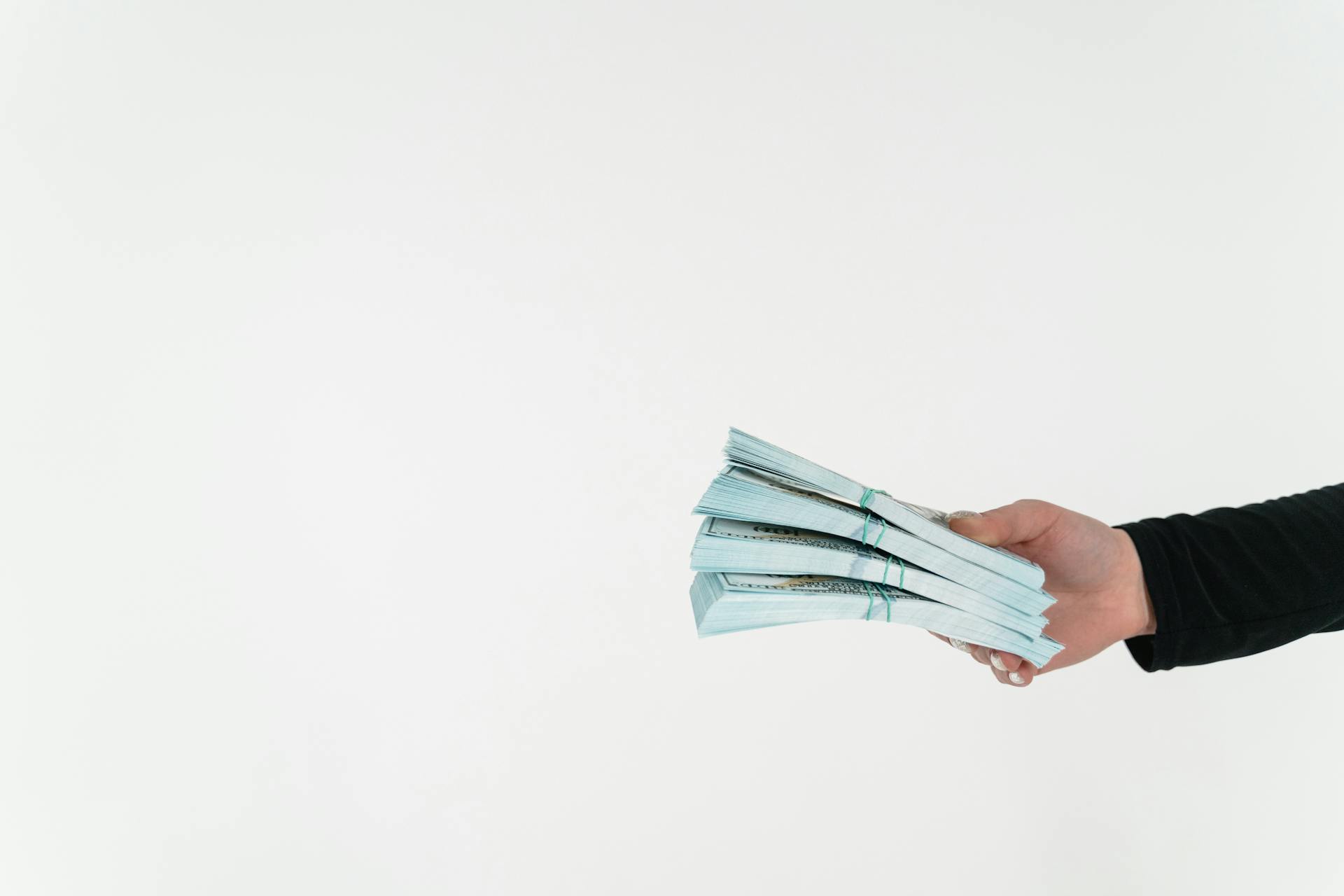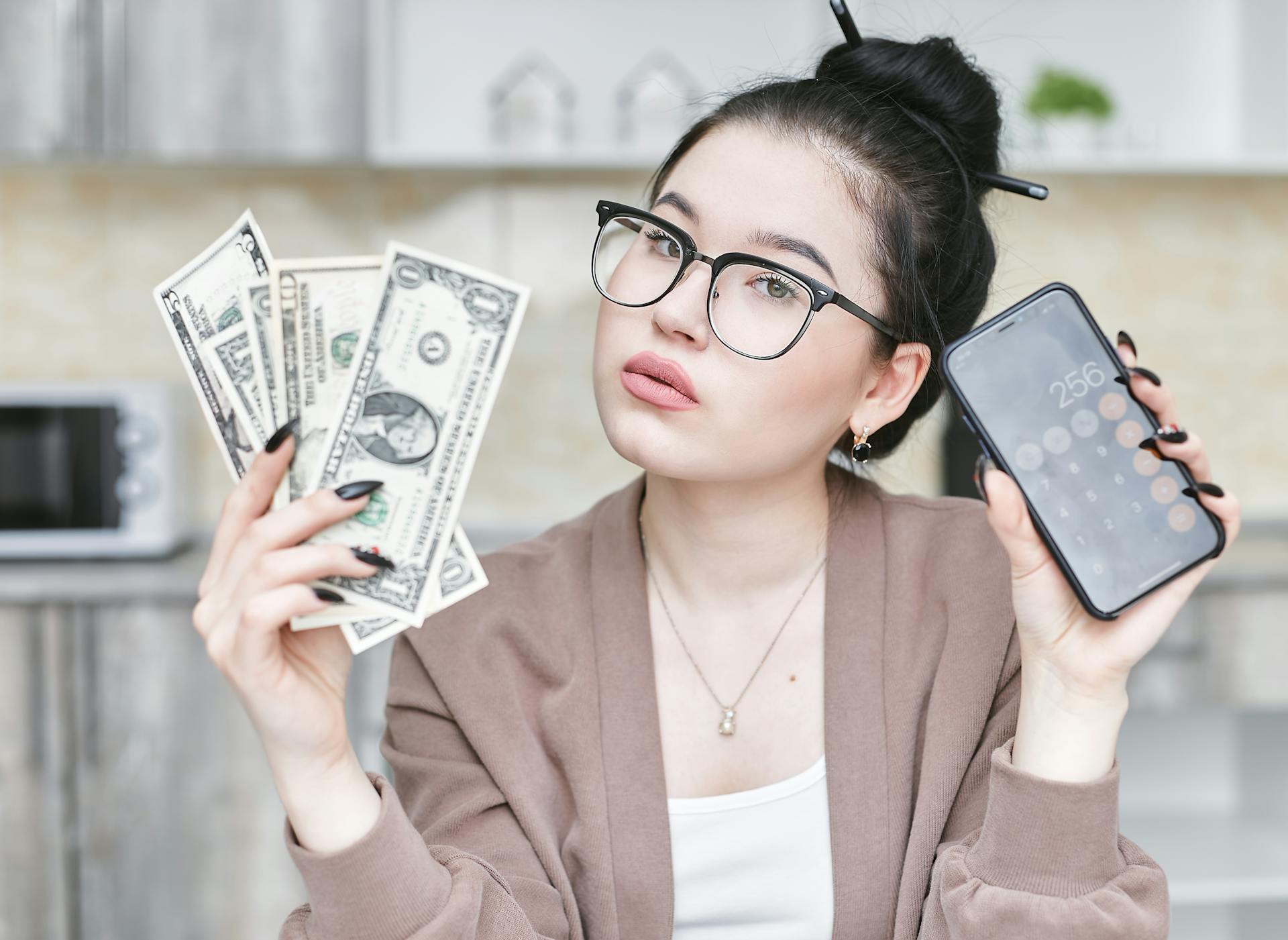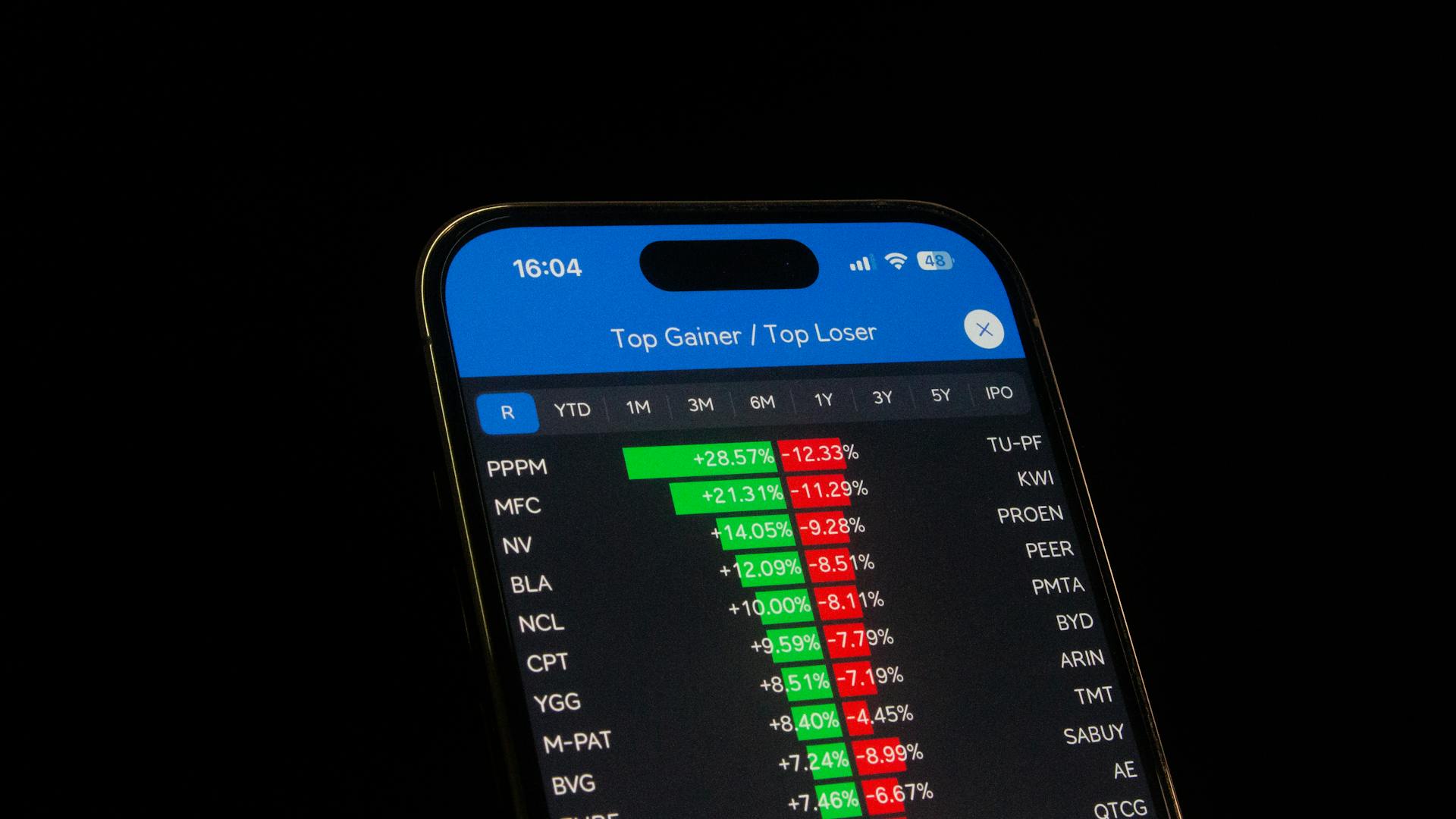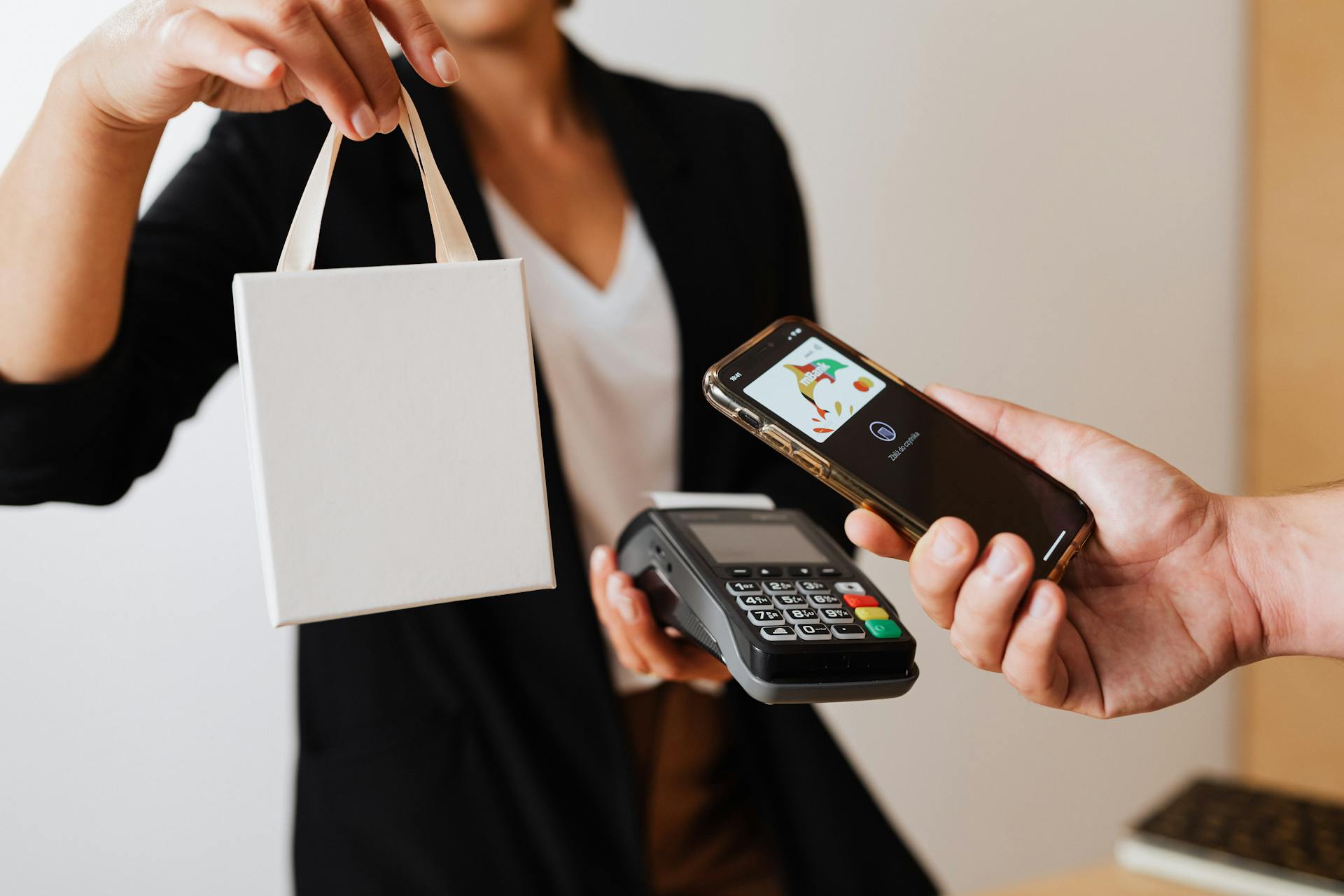
Cash App card scams are on the rise, and it's essential to be aware of the tactics scammers use to trick people out of their money.
Scammers often pose as Cash App customer support representatives, claiming that your account has been compromised or that you're eligible for a refund.
Be cautious of unsolicited calls or messages from Cash App, as they will never contact you to request sensitive information.
If you receive a call or message claiming to be from Cash App, hang up or delete it immediately, and contact Cash App directly to verify the authenticity of the message.
Cash App Card Scams
If you receive a Cash App debit card in the mail, don't ignore it - it's a huge red flag that your information is available online and you may be at risk of identity theft. Contact Cash App directly through the app to report the issue.
Scammers have been known to send unsolicited Cash App debit cards with instructions to download the app and scan a QR code to set it up. They've used stolen information, such as your name, SSN, and address, to open a Cash App account in your name.
According to the FTC, gift cards are the number one payment method for scammers, leading to $148 million in losses for consumers. If anyone asks you to pay for a prize or pay off fines with a gift card, it's a scam.
Here are some steps to take if you've been scammed on Cash App:
- Report the payment as a scam within 30 days of the transaction.
- Open Cash App and go to the Activity tab, select the payment you'd like to report, and tap the three dots in the top-right corner.
- Select Report an Issue > I was scammed.
Scammers Requesting Gift Cards
Scammers love gift cards because they're impossible to trace. They'll often pretend to be from a legitimate source, like Cash App, and claim you've won "free money" - all you need to do is send them a gift card to claim it.
According to the FTC, gift cards are the number one payment method for scammers, leading to $148 million in losses for consumers.
If anyone asks you to pay for a prize with a gift card, it's a scam. This includes Google Play cards and any other type of gift card.
Government agencies and legitimate businesses will never ask for payment via gift cards.
Explore further: Sell Gift Cards Instant Payment Cash App
Flipping Promises for Big Returns
Cash flipping scams promise big returns for small investments, but they're designed to scam people out of their money. Scammers often reach out to Cash App users on social media platforms like Twitter or Instagram with get-rich-quick schemes.
Be cautious of messages that seem too good to be true, as they usually are. Conduct an online search before contacting social media accounts that promote investment schemes, and you'll likely find threads from victims who have posted complaints and details about the scam.
Scammers may pose as friends or financial experts to gain your trust. They'll often start small, promising to turn a small amount into a larger sum, and then ask for more money to flip it again.
Here are some red flags to watch out for:
- Someone reaches out to you with a get-rich-quick scheme or a "guaranteed" investment opportunity.
- The offer seems too good to be true.
- The message comes from a "friend" but uses language or phrases your friend wouldn't use.
Remember, if you wouldn't give a random person on the street your money to flip, don't do it online. Treat your money on Cash App like real cash.
Prevention and Protection
To protect yourself from Cash App card scams, it's essential to enable two-factor authentication (2FA) on your account. This will add an extra layer of security to your login process, making it more difficult for scammers to access your account.
Keep your software and operating systems up to date, as these updates often address security vulnerabilities. This will help prevent scammers from exploiting known weaknesses in your devices.
Be wary of any unsolicited requests for money or sensitive information. Always think twice about sharing personal information or sending money to someone you don't know and trust.
You can follow these simple steps to protect your Cash App account:
- Enable two-factor authentication for your account.
- Keep your software and operating systems up to date.
- Be cautious when sharing personal information or sending money to unknown individuals.
- Verify the person or company you are dealing with before making any transactions on your Cash App account.
- Use the app's built-in security features, such as fingerprint ID or PIN code, to protect your account.
Self-Protection
To protect yourself from Cash App scams, it's essential to be proactive and take steps to safeguard your account and personal information. Enable two-factor authentication (2FA) on your account, but use an authenticator app rather than SMS for the code.
Be cautious of unsolicited requests for money or sensitive information, and always think twice before sharing personal details or sending money to someone you don't know and trust. Keep your software and operating systems up to date, as these updates often address security vulnerabilities.
For your interest: Cash Advance from Credit Card to Bank Account
Use the app's built-in security features, such as fingerprint ID or PIN code, to protect your account. If accessing your account or making transactions online while using public Wi-Fi, utilize a VPN for an extra layer of cyber protection.
Always verify the person or company you are dealing with before making any transactions on your Cash App account. Don't share your personal details online, and never share your Cash App PIN or other account details, even if you receive an official-looking email or message.
Here are some key self-protection tips to keep in mind:
- Be wary of any unsolicited requests for money or sensitive information.
- Enable two-factor authentication for your account.
- Keep your software and operating systems up to date.
- Use the app's built-in security features to protect your account.
- Verify the person or company you are dealing with before making transactions.
- Don't share personal details online, and never share your Cash App PIN or other account details.
By following these self-protection tips, you can significantly reduce the risk of falling victim to Cash App scams and keep your account and personal information safe.
Scammers Selling Hard-to-Find Items
Scammers Selling Hard-to-Find Items is a common tactic used to deceive unsuspecting buyers. They typically sell expensive items that are hard to find, such as concert tickets or rare collectibles.
These scammers often ask for payment via Cash App, knowing that it doesn't offer buyer protection. This means you have no way to get your money back if the item is fake or doesn't exist.
Some of the most common online shopping Cash App scams include selling fake concert tickets or rare collectibles. These items are often advertised as a great deal, but in reality, they're just a way to get your money.
To avoid falling victim to these scams, make sure to purchase items from established retailers or people you know personally. This will help you avoid fake Cash App business accounts and get your money back if something goes wrong.
Cryptocurrency Schemes
Cryptocurrency scams on Cash App often start outside the platform, typically on social media. You might come across a video on Facebook or Instagram promising massive returns on an initial investment if you transfer a certain amount to the scammer’s $Cashtag.
Scammers may also message you directly, asking you to invest in a small amount of cryptocurrency for big returns. This can be from a friend's social media account that has been hacked.
Cryptocurrency schemes have been found on Cash App since 2018, when Bitcoin was introduced to the platform. Scammers have since found ways to capitalize on this feature.
To avoid falling victim to these scams, be cautious of unsolicited messages or videos promising unusually high returns.
Identifying and Reporting Scams
If someone is scamming you via Cash App, you'll know it's not legitimate if they reach out to you on social media claiming to be customer service representatives. They'll often ask for your sign-in PIN or other sensitive information, or request personal information or ask you to send money for a service.
Legitimate cash app representatives will never ask for your details via social media, phone, or any other channels. You can protect yourself by being cautious and verifying the identity of anyone claiming to be from Cash App.
Related reading: Citi Double Cash Card Customer Service
If you believe you've been scammed on Cash App, you should try to recover your money, secure your account, and report and block the scammer. Here's a step-by-step guide on how to report a scam on Cash App:
- Report the payment as a scam within 30 days of the transaction.
- Open Cash App and go to the Activity tab, select the payment you'd like to report and tap the three dots in the top-right corner.
- Select Report an Issue > I was scammed.
After reporting the payment, report the scammer's user account to Cash App, too. This may help you get your money back, ensure they don't contact you again, and protect other users from a known scammer. To report and block a scammer:
- Open Cash App and search for the scammer using their name, $Cashtag, phone number, or email address.
- Select their profile and tap the options to Report and Block them.
Recognizing Scams
Legitimate Cash App representatives will never ask for your sign-in PIN or other sensitive information via social media, phone, or any other channels.
Be cautious of scammers who reach out to you on social media claiming to be customer service representatives from Cash App.
Scammers may ask for personal information or ask you to send money for a service, which is a red flag.
To identify fake text messages, look out for suspicious senders and be wary of messages that ask for sensitive information.
A different take: Citi Custom Cash Card Customer Service
Scammers can impersonate a trusted organization via the phone, email, or text, so it's essential to verify the authenticity of messages before responding.
Here are some common tactics used by Cash App scammers:
- They reach out to you on social media claiming to be customer service representatives from Cash App.
- They ask for your sign-in PIN or other sensitive information.
- They request personal information or ask you to send money for a service.
- A Cash App user sends you money out of the blue and asks for a refund, which is often a scam.
If you're unsure about a message or transaction, it's best to ignore it and contact Cash App for assistance.
Identifying Scammers Selling Expensive Items
Scammers often sell hard-to-find items, like concert tickets or luxury items, online and ask for payment via Cash App. This is because Cash App doesn't offer buyer protection, so you'll have no way to get your money back if the item is fake.
These items are usually too good to be true, like discounted luxury items or rare collectibles. Scammers will stop responding after you pay, leaving you with no recourse.
To stay safe, make purchases only from established retailers or those you know personally. This will help you avoid fake business accounts that scammers use to sell desirable items.
Broaden your view: Cash App No Debit Card
Scammers may open fake Cash App accounts to sell great deals on concert tickets or rare collectibles. After you pay, they'll stop responding, and you'll be left with no way to get your money back.
Cash App business account scams are a real threat, so be cautious when making purchases. Always research the seller and check for reviews before making a payment.
What to Do If You've Been Scammed
If you've been scammed on Cash App, try to recover your money as soon as possible. The quicker you act, the more likely you are to stop the scam before it causes more damage.
To report a payment as a scam, open Cash App and go to the Activity tab. Select the payment you'd like to report and tap the three dots in the top-right corner.
You can report a payment as a scam within 30 days of the transaction. Report the payment as a scam by following these steps:
- Open Cash App and go to the Activity tab.
- Select the payment you’d like to report and tap the three dots in the top-right corner.
- Select Report an Issue > I was scammed.
After reporting the payment as a scam, you should also contact your bank's fraud department to inform them of the situation. They may be able to help you recover your funds, although most banks don't usually cover money lost through Cash App or other third-party peer-to-peer payment transfer apps in their policies.
If you've linked your Cash App account to a debit card or credit card, you can also file a dispute for the transaction with your bank. This may help you recover your lost money.
If you want to dispute fraudulent transactions or help convince Cash App to refund your lost money, you may need to file a police report. Contact your local law enforcement's non-emergency line and ask for their fraud department to create a file that you can reference when trying to get your money back.
Finally, you can also report the scam to the Federal Trade Commission (FTC) by calling 1-877-FTC-HELP or by visiting ReportFraud.ftc.gov. This will help track and report on scams, and may also help you recover your lost money.
Intriguing read: I Lost My Debit Card How Can I Get Cash
General Safety and Awareness
Cash App is generally safe, but it's not foolproof. With two-factor authentication (2FA) enabled, you'll receive a one-time passcode to your email or mobile phone when you log in.
To add an extra layer of protection, use Security Lock, which allows you to choose between a PIN or biometric security features like facial recognition or fingerprint ID.
Cash App uses end-to-end encryption technology to scramble payment data and help protect you from hackers. This means that even if someone intercepts your payment information, they won't be able to access your account.
However, Cash App doesn't offer robust protections for fraudulent transactions, unlike debit or credit cards. So, be cautious when sending money to strangers or unfamiliar recipients.
To stay safe, make sure to follow website safety best practices when transferring money using Cash App. Never use it to transfer money to someone you don't know.
Here are some safety features to take advantage of:
- Encryption: Any information you send through Cash App is encrypted, whether it's over private or public Wi-Fi, or a data service like 4G.
- PIN and sign-in protections: Whenever you sign in to Cash App, you are sent a one-time passcode.
- Biometric settings: Cash App has a Security Lock feature in its Privacy & Security settings, where you can toggle biometric data, like Touch ID or facial recognition, to send money.
- Notifications: If Cash App notices unusual activity, it will alert you through push notifications, text, or email.
- Fraud monitoring: Cash App occasionally cancels transactions that look out of the ordinary, but its protection is limited.
Remember, even with these safety features, it's still possible for scammers to target you. Be cautious when sharing your Cash App tag, and never share your personal information online, especially your PIN or one-time passcode.
Frequently Asked Questions
What if a random person wants to send me money on Cash App?
Be cautious of unexpected payments from strangers on Cash App, as they may be a scam. Don't accept random payments, and instead, report them to Cash App for further assistance
Featured Images: pexels.com


